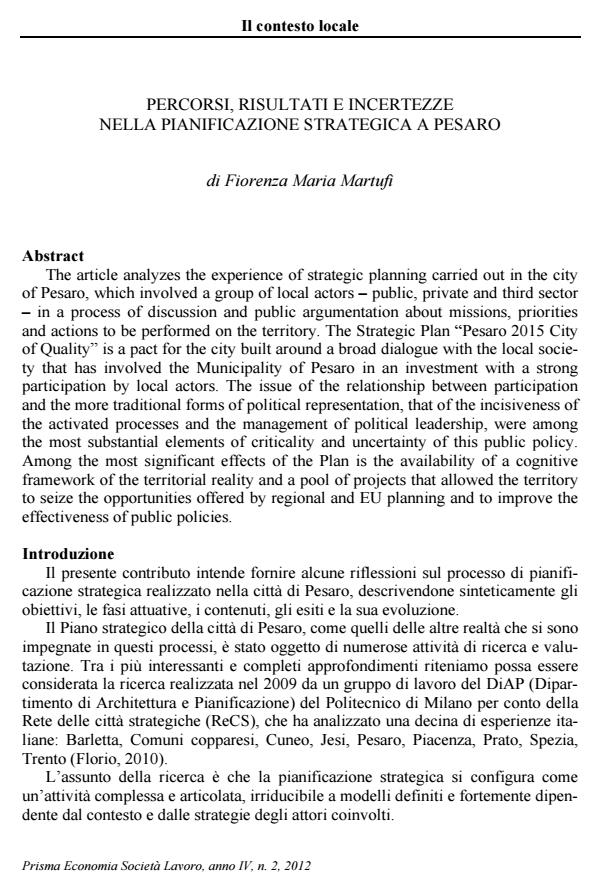Percorsi, risultati e incertezze nella pianificazione strategica a Pesaro
Journal title PRISMA Economia - Società - Lavoro
Author/s Fiorenza Maria Martufi
Publishing Year 2013 Issue 2012/2 Language Italian
Pages 13 P. 125-137 File size 201 KB
DOI 10.3280/PRI2012-002010
DOI is like a bar code for intellectual property: to have more infomation
click here
Below, you can see the article first page
If you want to buy this article in PDF format, you can do it, following the instructions to buy download credits

FrancoAngeli is member of Publishers International Linking Association, Inc (PILA), a not-for-profit association which run the CrossRef service enabling links to and from online scholarly content.
The article analyzes the experience of strategic planning carried out in the city of Pesaro, which involved a group of local actors - public, private and third sector - in a process of discussion and public argumentation about missions, priorities and actions to be performed on the territory. The Strategic Plan "Pesaro 2015 City of Quality" is a pact for the city built around a broad dialogue with the local society that has involved the Municipality of Pesaro in an investment with a strong participation by local actors. The issue of the relationship between participation and the more traditional forms of political representation, that of the incisiveness of the activated processes and the management of political leadership, were among the most substantial elements of criticality and uncertainty of this public policy. Among the most significant effects of the Plan is the availability of a cognitive framework of the territorial reality and a pool of projects that allowed the territory to seize the opportunities offered by regional and EU planning and to improve the effectiveness of public policies
- Barca F., (2009) “An Agenda for Reformed Cohesion Policy. A place – based approach to meeting European Union challenges and expectations Indipendent”, trad. it. “Un’agenda per la riforma della politica di coesione”, Rapporto preparato su richiesta di Danuta Hubner, Commissario europeo alla politica regionale, www.dps.tesoro.it/documentazione/comunicati/2010/rapporto%20barca%20(capitoli%201%20e%205)_ita%2001_07_2010.pdf
- Barca F., (2011) “L’approccio place-based della politica europea di sviluppo regionale”, Padova, www. programmicomunitari.formez.it/sites/all/files/Approccio% 20place-based%20-%20Barca%202011.pdf
- Calafati A.G., (2009) “Sviluppo sostenibile nelle città delle Marche”, Rapporto per Banca Europea degli Investimenti e Università Politecnica delle Marche, www.eib.org/attachments/documents/jessica_marche_calafati_it.pdf
- Conti S., Salone C., (2012) Territori di progetto nella programmazione regionale, www.storicamente.org/quadterr2/conti_salone.html
- Dente B., (2010) “Il punto di vista degli amministratori. Introduzione”, 3^ Quaderno ReCs, ReCs - Rete delle città strategiche, Firenze
- Donolo C., (2009) “Tesi (o ipotesi) sul governo della città”, note redatte per la Commissione CSS – Consiglio Italiano Scienze Sociali
- Florio R. (a cura), (2010) “10 anni di pianificazione strategica in Italia. Ragioni, esiti, criticità”, 3^ Quaderno ReCs, ReCs – Rete delle città strategiche, Firenze
- Pasqui G., (2010) “Un ciclo politico al tramonto: perché l’innovazione delle politiche urbane in Italia ha fallito”, XXIV Convegno SISP, Venezia
- Pasqui G., Armondi S., Fedeli V., (2010) “I Piani strategici alla prova”, 3^ Quaderno ReCs, ReCs – Rete delle città strategiche, Firenze
- OCDE, (2009) Region at a Glance 2009, Parigi
- Tourism in the City Chiara Rabbiosi, Massimo Giovanardi, pp.247 (ISBN:978-3-319-26876-7)
Fiorenza Maria Martufi, Percorsi, risultati e incertezze nella pianificazione strategica a Pesaro in "PRISMA Economia - Società - Lavoro" 2/2012, pp 125-137, DOI: 10.3280/PRI2012-002010